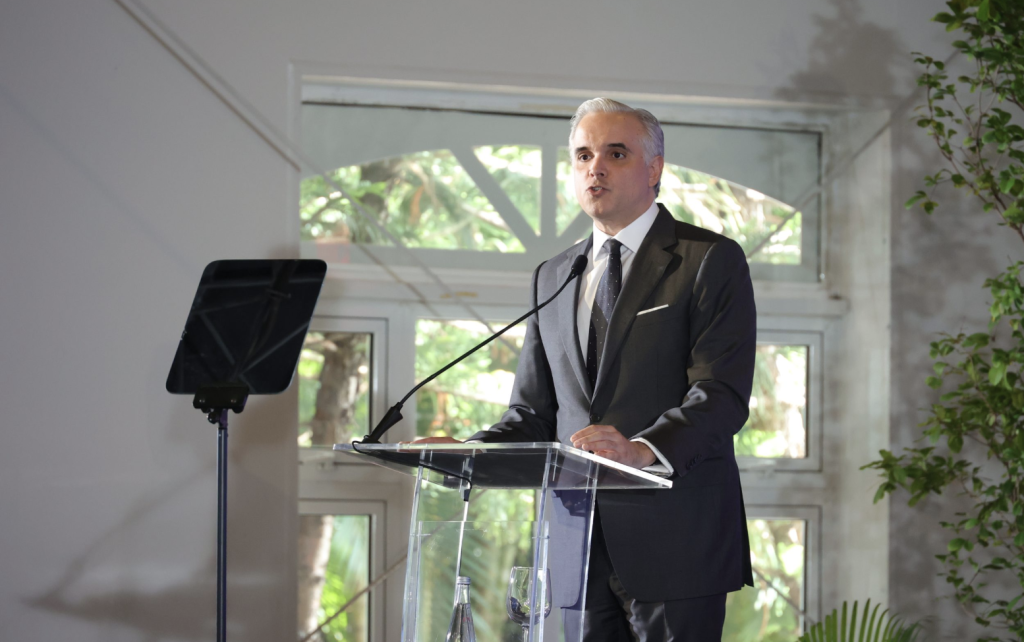
Education Minister Luis Miguel De Camps unveiled on Wednesday, 23 July 2025, a comprehensive educational strategy designed to boost national productivity, employment, and ethical development. Speaking as the keynote speaker and guest of honor at a luncheon hosted by the American Chamber of Commerce of the Dominican Republic (AmChamDR), De Camps emphasized that the future of innovation and jobs begins in the classroom.
An AmCham press release explains that De Camps highlighted the recently presented educational roadmap, which centers on teachers, families, students, civil society, and educational system professionals. This roadmap addresses key priorities: true literacy, technical training integrated with the productive sector, broad coverage and inclusion, values-based education, and transparent territorial management.
“The jobs of the future begin in the classroom. We must not only educate for degrees. We must build technical skills, critical thinking, problem-solving, emotional intelligence, and teamwork,” De Camps asserted to an audience of business leaders, academic figures, and civil society representatives.
The minister believes the Dominican Republic is poised for significant qualitative and quantitative advancements, drawing parallels to nations like South Korea, Estonia, and Ireland. His proposal advocates for a policy rooted in technical training, digital competencies starting in primary school, and national identity.
Key targets within the minister’s initiative include training 140,000 technicians by 2028 and equipping 400,000 young people with technical English skills through an active national plan already underway.
“Education for employment is a development policy and part of President Luis Abinader’s vision, which we are strongly committed to executing and further strengthening,” De Camps stated. “This is the most effective way to transform talent into growth and education into upward social mobility.”
A call for shared responsibility
De Camps also advocated for reactivating the National Pact for Education, proposing it as a shared strategy among the state, citizens, and the private sector to ensure quality and relevance across all educational levels, from early childhood to university.
Furthermore, he stressed the importance of fostering ethically sound citizens, not merely competent workers. To that end, “Moral, Civic, and Citizen Ethics” will become a core subject throughout the educational system starting in the 2025-2026 school year.
“Educating in shared values is a strategy for national sustainability. And that commitment begins in school,” De Camps underscored.
He emphasized that education cannot thrive in isolation, requiring the support of the broader social fabric. While demanding results from the educational system is crucial, it is not enough. “We must actively participate in its construction. Therefore, today I am not calling for philanthropy. I am calling for institutional co-responsibility,” he added, as highlighted in the press release.
Reporting on the presentation, Listin Diario spoke of the challenges ahead. De Camps acknowledged on Wednesday that the Dominican people are dissatisfied with the outcome of the 4% of GDP allocated to education, a policy implemented over a decade ago with high hopes for transformative change.
The 4% allocation for education was a landmark policy intended to overhaul the nation’s education system, but critics argue that the expected improvements in quality and access have yet to materialize. De Camps conceded that although some progress has been made, it has neither met the depth nor the pace the country had anticipated.
“There are still structural barriers that have not been overcome,” he said, emphasizing that the pace of reform has been insufficient despite significant financial investment.
Addressing the ongoing challenge of school dropout rates, the minister also expressed concern: “Too many young people are still leaving school before completing their education.”
Read more in Spanish:
AmCham
Listin Diario
24 July 2025

